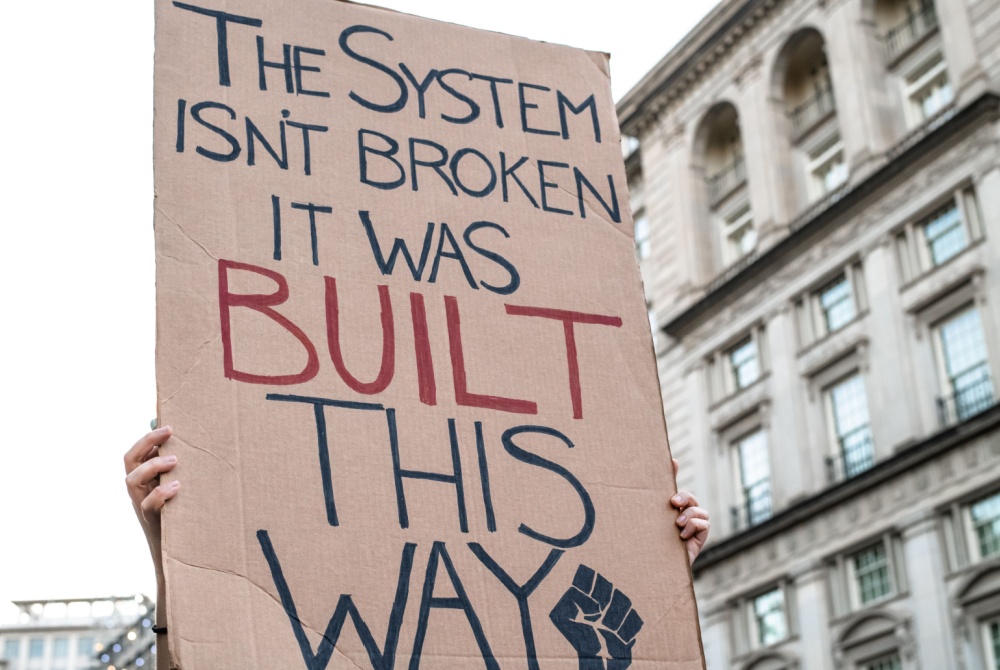
In the face of mounting attacks against racial equity, the Race and Equity in Philanthropy Group (REPG) issued a statement earlier this month calling for a “critical mass in philanthropy [to] courageously unite around a common transformative agenda and commit significant resources and other forms of capital” to protect racial justice and equity efforts. While these are potentially encouraging words, it remains to be seen whether the statement will lead to anything approaching what’s needed to counter the forces arrayed against equality, which have benefited from decades of focused funding.
The statement was the result of a February 2024 funder meeting in Atlanta convened by a task force within REPG, an affinity organization of 12 foundation “core members” and three philanthropy-serving organizations, or PSOs. Twenty non-REPG member funders attended the Atlanta event, “Advancing Equity through Philanthropic Strategy in Polarized Times,” which was sponsored by the Winthrop Rockefeller Foundation. The Atlanta meeting was the first of what organizers hope will be a series of gatherings across the country to share strategies and build a response to the ongoing anti-racial-equity backlash.
When we first reported on REPG last year, a different task force within the larger group had just published an open letter calling for equity-forward power sharing in philanthropy, and an initial framework on how to do so. Volume two of that power sharing framework, containing specific case studies of racial equity work done by member foundations, is planned for sometime this fall. The statement was written by Corey Anderson, chief innovation officer at the Winthrop Rockefeller Foundation, and David Maurrasse, founder and president of Marga Inc., which facilitates the Race and Equity in Philanthropy Group.
The sheer size and prominence of many of REPG’s foundation members inspires cautious optimism about the group’s potential for combating anti-equity forces and encouraging other funders to join them. Collectively, the foundations in the group hold assets worth more than $44.5 billion. Nine of the 12 have billion-plus balance sheets. The largest, the Ford Foundation, reported net assets of $13.9 billion in 2022; next up is the $12.8 billion available to the Robert Wood Johnson Foundation. The MacArthur, James Irvine and Annie E. Casey foundations round out the top of the list.
But despite the financial clout they wield, REPG’s members and supporters of racial justice efforts more broadly are facing a daunting level of opposition on virtually every front. Since the U.S. Supreme Court overturned affirmative action in higher education admissions last year, two Trump judges on the 11th Circuit Court of Appeals have struck down the Fearless Fund’s efforts to support Black women entrepreneurs, and a Texas-based nonprofit, Hidden Star, is facing a similar suit.
Meanwhile, as of April of this year, 85 bills attacking higher ed diversity programs had been proposed, with 14 of those passed into law and 14 awaiting signatures from their respective states’ governors. Republicans in the House of Representatives are dissolving the U.S. House Office of Diversity and Inclusion, and the 83 judges President Donald Trump appointed to the federal judiciary will be making and blocking policy for decades in the absence of meaningful court reform. Last but not least, the Trump and Republican-backed Project 2025 promises to reverse pro-equity policies for all marginalized groups throughout the federal government.
It may seem as though the ongoing anti-equity backlash is something recent, a right-wing reaction to the racial reckoning of 2020. But as REPG’s February statement says, these developments have deeper roots: “long-term strategic steps, involving philanthropy, that have spanned decades that led to new policies and an overall hostile climate.”
In order to “counter the tremendous backsliding that has been underway,” the statement says, “it is increasingly urgent that a significant enough critical mass in philanthropy courageously unite around a common transformative agenda and commit significant resources and other forms of capital continually and consistently.” We have, of course, seen segments of the sector step up in encouraging ways, especially following the events of summer 2020. But big questions remain about funders’ willingness to remain consistent.
As one potential means to that end, REPG hopes to hold “Advancing Equity” meetings across the country, particularly in areas where equity initiatives are under attack by Republican state and local governments, to allow funders in those areas to share their experiences and strategize about how to meet the moment.
“We’re not arrogant enough to think that this statement is a catalyst for a major action,” Maurrasse said. “We hope this statement can be inspirational in terms of people wanting to have this kind of strategic dialog, but we know that that next level of action really requires coordinated action among foundations, and really just a level of agreement” about what needs to be done and how to do it. (More information on Advancing Equity is available on the Marga, Inc. website.)
Whatever “level of agreement” pro-equity funders may end up coming to, it feels pretty clear that they’re going to have to act not only significantly and consistently, but also pretty quickly. The results of the 2024 election may provide a reprieve from the worst of Project 2025’s extremism, but neither those policy proposals nor the monied interests behind them are going away. Funders that don’t join the fight now, and instead pull back in the belief that doing so will make them safer, may well find themselves facing even greater challenges, and even restrictions on their work, in the future.
In addition to racial justice philanthropy, Dawn Wolfe covers women’s issues/abortion rights, LGBTQ philanthropy, and philanthropic reform. She can be reached at dawnw@insidephilanthropy.com
